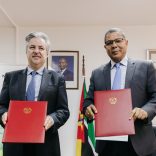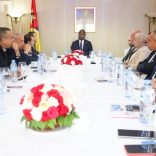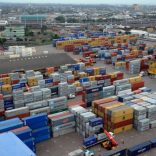Gasoline shortage in Niassa - Rádio Moçambique
Mozambique’s Sovereign Fund: $1B a year after ten years

FILE - For illustration purposes only. [File photo: Notíicias]
The Sovereign Fund of Mozambique (FSM), whose creation is to be voted on this week in parliament, is expected, within a period of ten years, to collect annually one billion US dollars in revenue from natural gas exploitation, the Minister of Economy and Finance announced on Wednesday.
“On average, over the 25-year concession contract [for natural gas exploitation], the Mozambican state will receive US$750 million (€685 million) [annually],” explained minister Max Tonela in the Mozambican parliament in answer to questions by deputies of the First Constitutional Affairs, Human Rights and Legality Committee and the Second Planning and Budget Committee.
The bill creating the Sovereign Fund of Mozambique, to be constituted with 40% of natural gas exploitation revenues, has already been approved by the Council of Ministers and is up for discussion at the 42nd Ordinary Session of Parliament in Maputo from 03 to 07 of August.
In the explanations given to the deputies on Wednesday (02-08) morning, the Minister of Economy and Finance highlighted forecast annual revenue of around US$100 million in the first three years and “incrementally”, from the fifth year onwards, around US$300 million (€273.6 million) per year”, rising after ten years to around one billion dollars (€912 million) annually.
Max Tonela also revealed that this year, “since the start of exploitation, the state has already received US$40 million (€36.5 million)” from natural gas exploitation, and that expectations are of US$100 million “by the end of the year”.
At the same hearing, the Minister gave assurances that the Sovereign Fund would have guarantees regarding “reporting” and “public information” on its performance and management.
“All Mozambicans will be able to access information on the market value, tax and income that will flow from the investments carried out by the Fund,” he said.
He also gave assurances that, from a transparency perspective, the State Budget will have a “specific section that will detail how the funds will be used”.
In the model for creating the Sovereign Fund, whose operational manager will be the Bank of Mozambique, Max Tonela claims that “successful examples in the world” were taken into account, and also “less good cases” in which “countries that had great resources but were ‘hitch-hiking’ on them, and raised consumption by the state too much, becoming too indebted just at the moment when the level of resources was falling off, thereby entering into a bind in which they did not have the capacity to deploy more [resources]”.
“Therefore, this is the ultimate purpose of the Fund. That is why we must look at current generations, but ensure that future generations also profit from the existing resources available in the country,” he explained, underlining that the Sovereign Fund would allow [the state] “to access resources to finance the State Budget in a situation where there is no longer any natural gas” to exploit.
The draft law creating the Sovereign Fund of Mozambique (FSM), to which Lusa has had access, states that “in its governance structure, it is intended that the Fund make full use of existing institutions in the country, guided by the principles of good governance, transparency, accountability, independence and inclusiveness, in line with international best practices”.
In the preamble to the proposal, the government recalls that, as part of the research activities carried out in offshore Areas 1 and 4 in the Rovuma basin, “huge deposits of oil and non-associated natural gas” , estimated at around 180 trillion cubic feet, were discovered.
In this context, the operators and partners of Areas 1 and 4 submitted to the government three natural gas liquefaction (LNG) projects, already approved, namely the Coral Sul FLNG platform, on the high seas, LNG Golfinho/Atum and Rovuma LNG.
At the same time, research is underway on five oil and gas research and production concession areas in Angoche, Zambezi Delta, where ” even greater benefits, in case of commercial discovery, are expected”.
The Sovereign Fund’s revenues will come from the production of liquefied natural gas in Areas 1 and 4 in the Rovuma basin, and future oil and natural gas development and production projects, as well as the Sovereign Fund’s “return on investment of revenue”.
“Whenever a public calamity occurs in a given year that leads to the declaration of a State of Siege, or Emergency, or War (…) financial resources can be transferred from the Sovereign Fund of Mozambique to support the State Budget,” in this case in percentages higher than expected (between 50% and 60% of revenues), as proposed by the government.
“The Sovereign Fund of Mozambique must invest in assets that are not in the oil and gas sector,” the proposal submitted to parliament further establishes, noting that these investments must be made “based on the policy” approved by the government.
A “prohibition” on the use of Sovereign Fund resources for the “provision of guarantees in contracting loans by the state or other entities” is also stipulated, even for “debt payment and debt service without going through the State Budget”, or to finance “political and political party activities” in the “contraction of debts”.
READ: Mozambique: Renamo wants Sovereign Wealth Fund managed by independent body
Mozambique’s Sovereign Fund: Civil society challenges government to improve structural issues












Leave a Reply
Be the First to Comment!
You must be logged in to post a comment.
You must be logged in to post a comment.